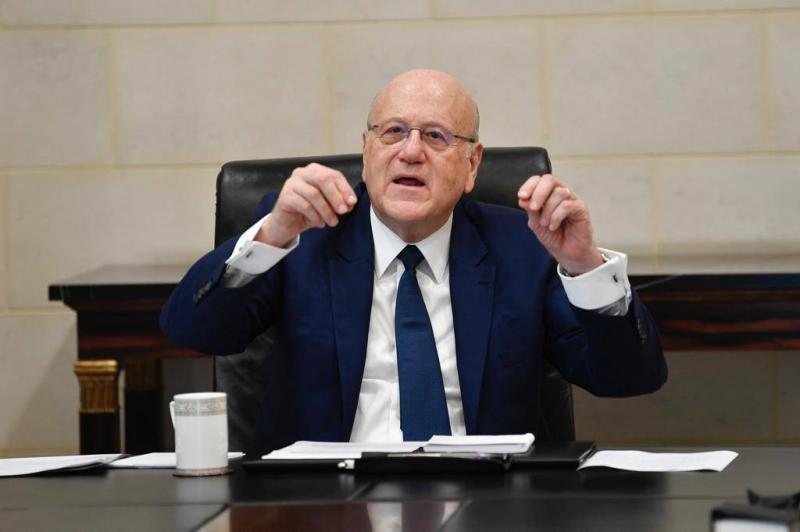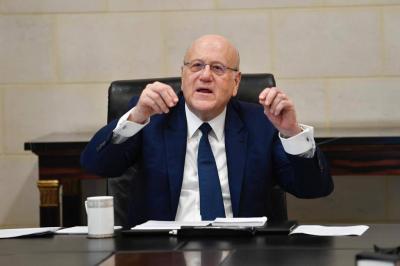Lebanon's caretaker Prime Minister Najib Mikati chaired a cabinet session this morning, Wednesday, at the Grand Serail to discuss financial, administrative, and employment matters. In his remarks during the session, Mikati pointed out that "our nation is entering today the threshold of the second year of vacancy in the presidency, and this vacancy greatly affects the country due to what the presidency symbolizes and the fundamental role of the President. We call for and demand the speedy completion of this constitutional entitlement despite all the challenges, difficulties, and crises the country is experiencing."
He added: "Our government bears a national responsibility in exceptionally delicate circumstances, and we are fulfilling our duties. We repeat our call to all ministers to attend and participate with us in shouldering responsibility, and they have our full respect. They must be present with us, and we must work together, especially in these precise conditions on all political, security, economic, health, and social levels."
Mikati continued: "If we compare the situation between today and the same date last year, when the presidential vacancy occurred, we must say that the situation is much better than it was despite all the bickering and campaigns being waged. This effort is due to the work of all ministers in their ministries to preserve the state's entity and institutions. Even on the economic front, the efforts being made are evident to all."
Mikati confirmed that "Lebanon is present in all diplomatic communications being conducted. In the context of these communications, I visited Qatar to assess the latest talks and the possibility of reaching a ceasefire. After that, other endeavors can begin. As I mentioned before, there is a race between a ceasefire and the situation spiraling out of control. Therefore, a five-day ceasefire is necessary under a humanitarian banner, during which international communications will be active to complete the process of prisoner exchange to establish a permanent truce and agree on the necessary lines to achieve peace in the region. We've had enough wars in Lebanon, and we are in favor of peace. The decision for war today lies in Israel's hands."
He viewed the "Israeli aggression against the south, and the resulting martyrs, victims, destruction of homes, burning of crops, displacement, and economic and financial damages affecting the whole nation are broad headlines awaiting the silent international community regarding the truth. Furthermore, the daily Israeli crimes in the Gaza Strip are a disgrace on the conscience of humanity and a destruction of all the values and principles on which international justice is founded. Unfortunately, the powerful now claim to possess the right while we were raised to understand that the right is the source of strength."
Mikati reiterated that "this government is doing its work constitutionally and strives to keep Lebanon present in international forums to express its position and defend its rights and raise its voice. In the coming period, I will continue my Arab tour."
He emphasized that "the time for rescue is now, and national solidarity is essential. Existential threats surround us and the region, and it is our duty to meet, discuss, and think together to reach a comprehensive national solution, combining goodwill and good intentions to work together."
**Minister of Economy**
For his part, Minister of Economy Amin Salam stated that Lebanon requested a shipment of 30,000 tons of wheat, expected to be delivered within two weeks. Salam mentioned that the country is in a good position regarding wheat imports.
**Minister of Finance**
Caretaker Minister of Finance Youssef Khalil revealed that "the ministry has prepared an emergency plan to address any negative repercussions due to the current situation in the region, anticipating any developments on the internal level." He stated that "the plan has three main points addressing how to confront the crisis regarding public finances, with an emphasis on the importance of continuous coordination with monetary authorities to enable liquidity management through enhancing cash inflows to avoid pressure on the exchange rate."
Regarding expenditure, Minister Khalil confirmed that "addressing any risks requires reconsidering expenditure priorities in light of available resources, with facilitating public service being the top priority." On financing, he pointed out that "continuing to enhance revenues, diversify sources, and expand the revenue base, especially some fees and taxes in foreign currency, would strengthen the financial situation, particularly in a time when borrowing from financial markets has become impossible. Thus, it is essential to expedite the approval of the budget due to its corrective items aimed at increasing expected revenues from about 15% of GDP for 2023 to around 18% for 2024."
Khalil stressed that "the approval of the budget grants financial authorities flexibility in addressing any challenges by providing allocations for the government's emergency plan, especially since the Ministry of Finance still relies on the twelfth rule of the 2022 budget, which adopted an exchange rate of 15,000 Lebanese pounds to the US dollar, while spending is currently subject to the market exchange rate." He considered that "spending through treasury advances inevitably affects financial regularity." He noted that "the plan was built on fears and warnings of the political and security situations slipping and the disruption of airport and port movements and international trade, as these would negatively impact and threaten Lebanon with a loss of approximately 63% of its current revenues."




